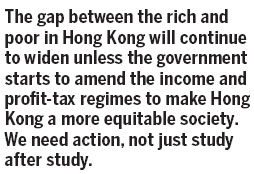Raise taxes to help the poor
Updated: 2013-05-15 06:21
By Fung Keung(HK Edition)
|
|||||||

A local newspaper reported on Sunday that Hong Kong lawmakers plan to spend HK$560,000 to tour Sweden and Finland and study poverty in those two countries. What a shame!
What a waste of time and money. The money can be used to help the estimated 200,000 poor families in the city to have a better life.
The workable formula to ease poverty in the city is a no-brainer. We can have a two-pronged approach. But it requires strong political will on the part of the government and lawmakers to change the status quo and upset the rich and famous in the city. On one hand, we should draw down our bountiful fiscal reserves and spend more on social welfare, subsidize single-parent families, the loners and the elderly; and provide more job opportunities such as helping the needy to start social enterprises in new towns to make a living.
On the other hand, we should have the political will to change the tax regimes, both personal tax and business profit tax. Yes, I know. Powerful people will accuse me of upsetting the apple cart. But nothing ventured, nothing gained, right?

There is nothing wrong in adopting the so-called Robin Hood approach, i.e., "robbing the rich to aid the poor". Income tax in Hong Kong is capped at 17 percent. As a middle-class citizen, I am more than willing to pay a higher salary tax to make the community more equitable. I am sure many friends of mine will agree with me and do the same thing to help the poor.
Why can't we have a steeper tax regime such as the ones adopted by Sweden and Finland and many industrialized countries? In Sweden, the highest income tax rate is 57 percent, while in Finland, it is 51 percent. Why does Hong Kong remain stuck in the colonial era.
The problem with our government is that it dares not touch the rich and powerful. It would take strenuous political will for Chief Executive Leung Chun-ying to overhaul the income-tax regime.
The salaryman who went home with the highest income in 2012 took with him HK$200 million. He only paid 17 percent of that amount as income tax. Even if he paid 50 percent tax, he would still have HK$100 million, enough for him to live comfortably for the rest of his life. He has been the chief executive of a publicly traded company in Hong Kong. I have no doubt that his personal assets easily exceed HK$1 billion since he has been with the same company for over two decades. Multimillion dollar income earners, I am sure, are everywhere.
The highest profit tax paid by a company registered in Hong Kong is 16.5 percent, not to mention many of the local companies registered in the Cayman Islands to evade tax. So the effective profit-tax rate is much lower than the official 16.5 percent. In Sweden and Finland, local corporations pay 53 percent and 41 percent profit tax, respectively.
I hate to sound like Robin Hood, but it is evident that the administration here doesn't have the will to change the company profit-tax regime because most big local companies are controlled, not surprisingly, by the rich and powerful family clans.
The gap between the rich and poor in Hong Kong will continue to widen unless the government starts to amend the income and profit-tax regimes to make Hong Kong a more equitable society. We need action, not just study after study.
And in the meantime, lawmakers should refrain from making trips to countries such as Sweden and Finland. The money they plan to spend on the trip can go a long way to helping the poor.
The author is coordinator of the B.S.Sc in financial journalism program at Hong Kong Baptist University.
(HK Edition 05/15/2013 page1)